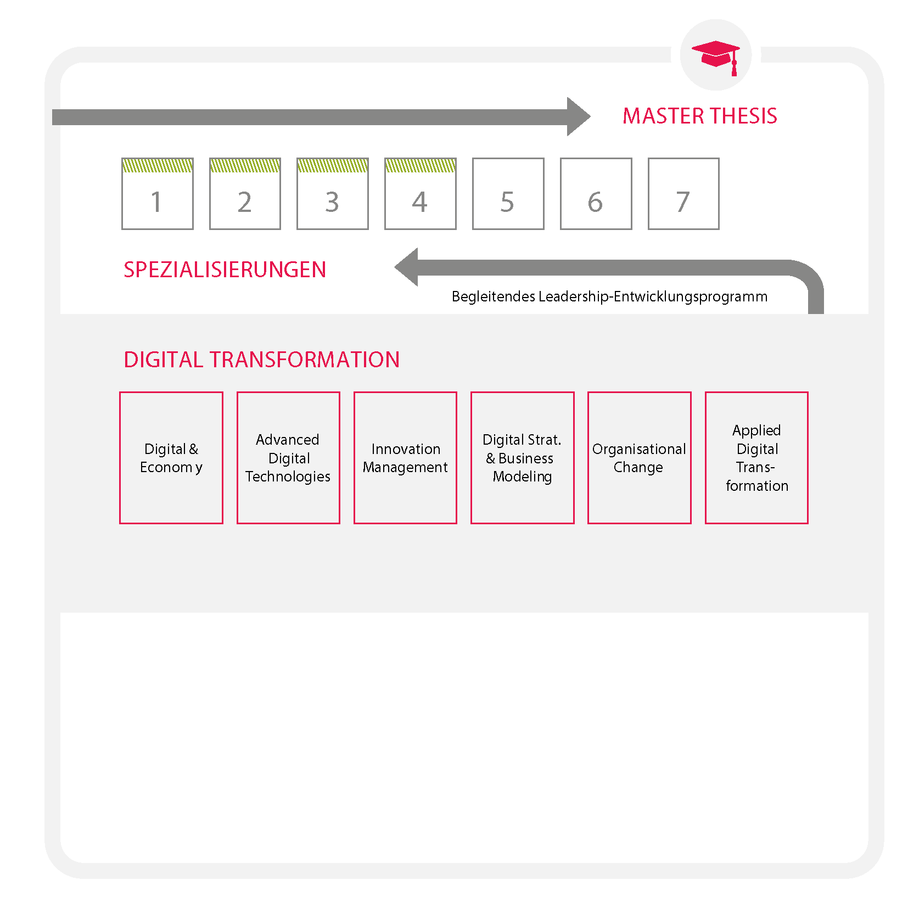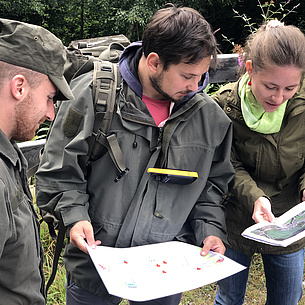
![[Translate to Englisch:] Logo Lead Transformation, Bildquelle: TU Graz Logo and text:lead transformation](https://www.tugraz.at/fileadmin/user_upload/tugrazInternal/Studium/Studienangebot/Universitaere_Weiterbildung/LeadershipDigitalTransformation/Master_LeadTransformation_2zu1.jpg)
Dates and Deadlines
Next start: 2 March 2026
For this start, only the specialisation 'Green Microelectronics' can be selected. Further information
Application deadline: 31 January 2026
Key data
- Degree: Executive Master of Business Administration in Digital Leadership (EMBA)
- Duration: 18 months (3 semesters), 28 days in attendance
- ECTS credits: 75
- Language of instruction: English and German
- Participation fees: 24,900 EUR (VAT-free). These fees do not include travel, accommodation, and subsistence costs.
- Programme location: TU Graz and online
Content and key areas
The EMBA programme consists of the following modules:
- Digital Transformation core modules (compulsory modules):
- Executive Leadership development modules (compulsory elective modules)
- Agile Leadership Lab
- Leadership in the Digital Transformation
- Executive Career Development Lab
- Modules that are part of the chosen specialisation
The following areas of specialisation are available:
- Green Microelectronics
- Digital & Sustainable Production
- Future Mobility & Management
- Digitisation & Energy Management
- Digital Construction Management
- Agile Skills & New Work
- Digital Finance & Accounting
- Smart Service Systems & Management
In addition, a master's thesis must be written.

Teaching and learning methods
The part-time EMBA programme has a modular structure, and teaching takes place in the form of blended learning (a combination of distance learning and attendance units).
Each module consists of 3 phases:
- Online phase: In this phase, you will acquire fundamental knowledge about the subject in a self-directed manner by referring to basic literature and learning videos. Participants can access the TU Graz "TeachCenter" learning platform in order to ask questions and exchange information with lecturers and other course participants. Scope: 1.5 ECTS
- Attendance phase: In the attendance phase, you have an opportunity to discuss the acquired knowledge is discussed, reflect upon it, further deepen this knowledge, and to apply it to case study examples (an attendance block is held at TU Graz every two to three months, each time from Monday to Friday). Scope: 1.5 ECTS. Students who cannot be on site for professional reasons can participate in the lectures via the video conferencing system.
- Transfer phase: This phase is carried out individually at your own or a chosen company. In this phase, you have the opportunity to apply your acquired knowledge in the context of your company, fulfil a company task, or work to solve a company problem. Scope: 2 ECTS
Job prospects and career opportunities
Why you should participate in this university certificate programme
You benefit from:
- A combination of online teaching and attendance units (blended learning approach)
Each module is prepared for self-directed learning, enabling you to choose the time and place of study, in an online phase. The attendance phases enable you to deepen the acquired knowledge, e.g. by working on practical case studies. - Transfer projects
In these projects, you have the opportunity to tackle an operational task or address an issue that is relevant to you and to apply the knowledge you have already acquired. - Individual or customised continuing education
Choose a specialisation that suits you as well as in-service transfer projects in order to acquire specific expertise that you can apply in your everyday professional life. By carrying out and writing a master's thesis, you have the opportunity to address current professional challenges and to develop solutions. - State-of-the-art scientific knowledge
Research results from TU Graz and its cooperation partners form the foundation of the programme. For this reason, you have first-hand access to expert knowledge that is relevant for the future. - Networking and learning from the peer group
In targeted networking and dialogue events that combine examples from practice and science (e.g. Onboarding Conference, Midterm Conference), you have the opportunity not only to exchange professional and interdisciplinary ideas with the other participants, but also to form direct contacts with experts.
After receiving the master's degree
- You will understand the strategic interplay between artificial intelligence, collaboration tools, and agile organisations with increased self-organisation, as well as the associated changes in management roles.
- You will be in the position to successfully lead an entire company or individual company divisions strategically and operationally, guiding them through the digital transformation. You will be able to approach your leadership tasks holistically, drawing on your networks and achieving optimal methodically support.
- You will be able to design digital strategies and business models as well as to strategically reflect on and assess the benefits, limits, and opportunities of using technological solutions, as well as understand how to initiate and lead change and innovation projects.
- Your expertise in the key area of executive leadership will enable you to apply what you have learned to real business challenges and practice new leadership skills.
Application
Admission Requirements
To be admitted to the university program, applicants must provide proof of the following qualifications:
-
Completion of an internationally recognized Bachelor's or Master's degree in a technical, scientific, economic, or legal field of study (minimum of 180 ECTS),
-
Several years of qualified professional and leadership experience (at least 2 years), and
-
Sufficient proficiency in the language of instruction, English.
Application
The Executive MBA in "Digital Leadership" has been developed for executives from various sectors who have several years of leadership and management experience and who would like to take the next step in their career or to continue to develop in their existing position against the backdrop of digital change, becoming more proficient in the broad subject area of developing and applying digital transformation strategies (incl. leadership skills).
Required documents when applying online:
- Completed and signed application form
- Curriculum vitae
- Proof of academic degrees already obtained or proof of teaching or school-leaving qualifications
- Work confirmations and certificates
- Letter of motivation
- Copy of passport or identity card
The documents must be submitted online at: helmut.aschbacher@tugraz.at
cooperation partners
The lecturers come from the following institutes, facilities, and cooperation partners:
TU Graz:
- Institute of Business Economic and Industrial Sociology
- Institute of Electricity Economics and Energy Innovation
- Institute of Automotive Engineering
- Institute of Production Engineering
- Institute of Technical Informatics
- Institute of General Mangement and Organisation
Montanuniversity of Leoben:
Consultancy companies:
Lecturers and contact information

Contact
Helmut ASCHBACHER
Dr.
TU Graz Life Long Learning
Phone: +43 316 873 4943
helmut.aschbacher@tugraz.at
Scientific head
Institut für Unternehmungsführung und Organisation
Kopernikusgasse 24/IV
8010 Graz
www.ufo.tugraz.at
Stefan Vorbach
Univ.-Prof. DI Dr.techn.
Tel.: +43 316 873 7500
stefan.vorbach@tugraz.at

![[Translate to Englisch:] Modul Digital & Green Economy](https://www.tugraz.at/fileadmin/_processed_/5/e/csm_Digital-Economy-Bildquelle-AdobeStock-by-Thapana-Studia_ae76c09b57.jpg)




![[Translate to Englisch:] Applied Digital Transformation Adobe Stock [Translate to Englisch:] Mann steht vor interaktiver Wand](https://www.tugraz.at/fileadmin/_processed_/b/1/csm_Applied_Digital_Transformation_AdobeStock_322230356_by_NicoElNino_9df1cc877f.jpg)


